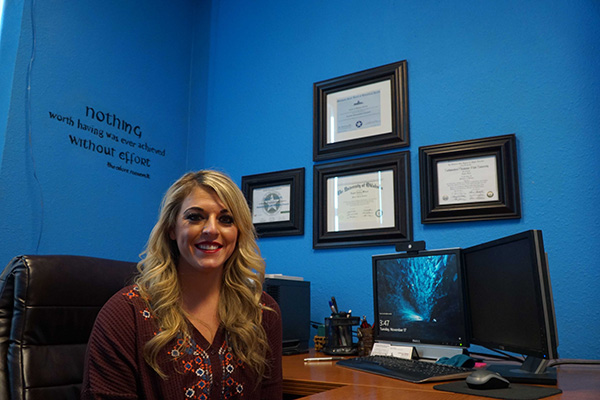By GEORGE SMITH, Student Reporter
Stress is something many college students will find themselves dealing with at one point or another.
At Northwestern, students and faculty can work with the director of the university’s counseling and career services, Taylor Wilson, to manage their stress.
“If there is one thing to be thankful for, it’s Taylor’s commitment to her job,” said Calleb Mosburg, the university’s dean of student affairs and enrollment management. “She’s a wife and a mother and still does her best to take care of our students’ needs.”
Wilson said she has seen an uptick in the amount of service her office has provided lately.

She said the coronavirus pandemic is one reason why more people are seeking help.
The pandemic has altered the format of school and teaching methods, placing additional strain on the vitality of students’ mental health.
Wilson said her services are used because of their accessibility.
“This year, I have been trying to develop and disperse more information regarding mental health to be able to reach the students that are not ready to seek counseling services,” she said.
Wilson’s services are free to Northwestern students.
“Students can request a counseling appointment through the NWOSU counseling webpage,” she said. “In efforts to meet all students’ demands, we offer short-term counseling sessions to all students, averaging from four to six sessions per semester. The first appointment will be a brief screening to discuss counseling needs to determine the appropriate level of therapeutic care.
“Following the initial screening, recommendations will be made for the most beneficial route to help with concerns.
“Suggestions can include short-term counseling on campus, referral to other campus resources or long-term counseling with off-campus community providers.”
Wilson said one way for students to manage their stress is to effectively manage their time.
“Make a schedule and stick to it,” she said. “Either a 30-minute increment or an hour increment schedule, and fill it up with your class times, when to do homework, and at least 30 minutes of self-care.”
She also advises students to gather all of the syllabuses for their classes and write in the due dates of their assignments in a daily planner.
Students should check both planners daily to stay on-track, she said.
